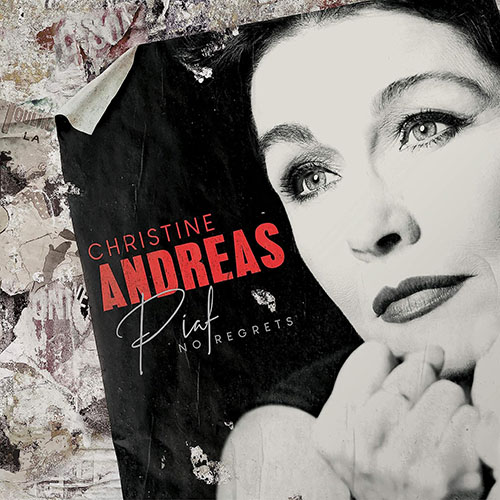Christine Andreas
Piaf: No Regret
(ps classics)
June 15, 2021
Reviewed by Alix Cohen

Christine Andreas’ connection with Edith Piaf is formidable. Perhaps in another life she huddled and sang in the streets with her heroine. As a sensitive woman, an actress, and a French speaker, Andreas channels “the Little Sparrow” like no one else. To begin with, she has arguably the best “trill” in the business.
This CD of French songs, often sung in English, is a welcome immersion for Francophiles and romantics. Lush orchestrations add to its ardent spirit.
“L’Accordéoniste” (Michel Emer) is a sweeping waltz that stops and starts as it tells the story of a prostitute. Andreas understands the French preference for pairing dark and light. The vocalist offers a long note that whirls like a chiffon cyclone. Breathlessness is an illusion. “La valse de l’amour” (Marguerite Monnot/Edith Piaf) is a wise and tender carousel waltz. “There’s always a heart/Which is searching for another heart/So begins/A romance/It’s the waltz of love.
From “Mon legionnaire”: “I didn’t ask the name/I knew nothing of him/He made love to me all night long/My legionnaire/He didn’t stay in my life/He left in the morning/Full of light” (Monnot/Raymond Asso). Andreas sings it as though she always that knew “he” would leave. The lyrics cast shadows that are unhappy but not rueful.
“Autumn Leaves” (Joseph Kosma/Jacques Prevert, English lyrics by Johnny Mercer), curiously sung only in English, shimmers; the singer’s restraint carries through the beautiful instrumental. “Mon Manége à moi” (Norbert Glanzberg/Jean Constantin) arrives bright and flirty: “You make my head spin/The merry-go-round is you.
” Andreas’ voice skips, twirls, and dances without a false move or frayed note.
“The Poor People of Paris” (Monnot/ Rene Rouzaud; English lyrics by Jack Lawrence) is based on “La goualante du pauvre Jean” (“The Ballad of Poor John”). Its English-language title arises from a misinterpretation of the French title, as “pauvre Jean” was taken for the same-sounding “pauvres gens,” which translates as “poor people.” A jaunty duet with director/arranger Martin Silvestri is a tongue-in-cheek defense of the lucky French: “I feel sorry for the French/Every guy has got a wench/Every couple’s on a bench.” Like a music-hall number, it has effervescent dialogue.
Jacque Brel’s classic “Ne me quitte pas” (“Never Leave Me”) (English lyric by Rod McKuen) is deeply melancholy. Part whisper, part pleading promise, it anticipates the worst. There are tears in Andreas’ voice and a dramatic stress in her delivery. “Sous le ciel de Paris” (“Under Paris Skies”) (Hubert Giraud/Jean Drejac; English lyric-by Kim Gannon) is an exhortation to give in to temptation no matter what ensues: “Paris is just a gay coquette/Who wants to love and forget.” One can’t help but sway.
In “I Love Paris” (Cole Porter) the vocalist’s voice fans out as if covering the entire city—every beloved, cliché image, each memory and hope. It’s palpably warm. She sings Piaf’s signature “La vie en rose” (Piaf/Louiguy) with heart in her voice as it segues from declaration to Fabergé delicacy and showcases her extraordinary vocal control. Perhaps the icon’s best-known song, “Non, je ne regrette rien” (Charles Dumont/Michel Vaucaire) is an anthem. You can practically see Andreas’ nostrils flare. We end with the exuberant polka “Milord” (Monnot/George Moustaki), which is all grit and joy.
The CD is orchestrated by Larry Blank.





